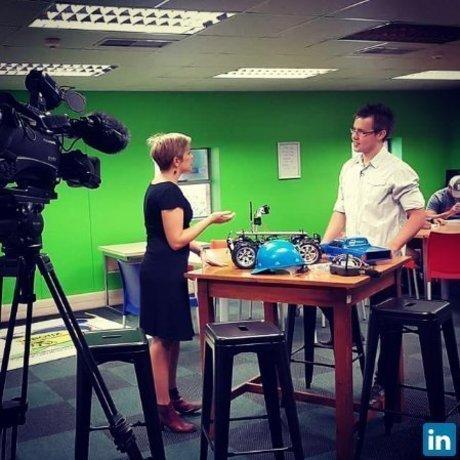RoaringAI
- 0 Collaborators
Detection, Recognition and Early Illness detection in Wild Animals ...learn more
Overview / Usage
Project focus:
Early sickness detection and tracking of wild animals using Artificial Intelligence to prevent the extinction or spread of epidemic diseases. Also live characterisation including a Name and details of the animal.
Intel technology(s) used:
Intel Deep Learning SDK , The Intel® Xeon Phi™ processor
Description of the demo:
Lions are one of South Africa’s biggest attractions generating ZAR1.5 Billion in the revenue in Kruger Park Region. If they were to grow extinct it would have very negative effects on our economy as they are one of the iconic Big 5. The biggest threat is sicknesses spreading while they feed from their prey eg: bovine TB (BTB) Also known as Tuberculosis
Using AI, our idea is to train a model analysing faces of animals to identify, recognise and detect the state of its wellbeing, as well as characteristics to plot patterns of where these animals move around. Early detection system for illness in wild animals are crucial not only for the herbivores grazing around, but just as crucial for the predators eating them. People posting their photos on social media eg. Twitter using a hashtag will receive a retweet with the animal’s characteristics. When our software finds visible signs of sickness, a local vet or nature conservationist receives a notification to check the animal out.
Key messages:
How does this demo showcase Intel contributions, innovations, and partner collaborations to our audience?
Making use of the free tool offered by Intel known as the Deep Learning SDK we show the public how an ordinary idea can become a revolutionising concept. Not only improving a animal’s wellbeing, but keeping the country we call home disease free.
What is new and compelling about this demo?
It is impressive that humans have the ability to use their intelligence to make things that not only improve the efficiency of their daily lives, but also to ensure the prosperity of other beings that inhabit our Earth. The deterioration of our planet by industrialisation is becoming a pressing issue for environmentalist, nature conservationist, ecologist and nature lovers in general, and is also threatening the quality of our lives. Thus, being able to use this technology as a preventative measure proves to be a breakthrough in history, not only veterinarian sciences, but medical science as a whole
Why should you care?
We all share our lives on social media — Now your African adventure can save a pride of lions or stop and prevent an epidemic disease from spreading. This also creates a platform for other problems to be solved like detecting potholes in our roads using your dash-cam or providing the nutritional facts of meals to customers who tweeted an image of eg. McDonalds Cheese Burger.
Call to action for this demo:
Instead of being confined to your workstation or desk at home, go outside and interact with nature. Re-discover your humanity. They should also realise the value in technologies like the Intel Deep Learning SDK or Intel optimised frameworks to deploy and solve problems in your area in rapid time.
Future business opportunities:
Portable or clip on camera embedded with Movidius VPUs to do real time classification of animals
Clip on camera on car can be controlled by smartphone in car . Photo’s
Adding additional sensors to high risk animals in order to capture extra data to help with better illness classification.
References:
https://africageographic.com/blog/more-than-half-of-southern-krugers-lions-may-have-tb/
http://www.krugerpark.co.za/krugerpark-times-2-21-buffalo-tb-21399.html
http://www.health24.com/Medical/Tuberculosis/TB-in-south-africa/kruger-lions-threatened-by-tuberculosis-20160323


